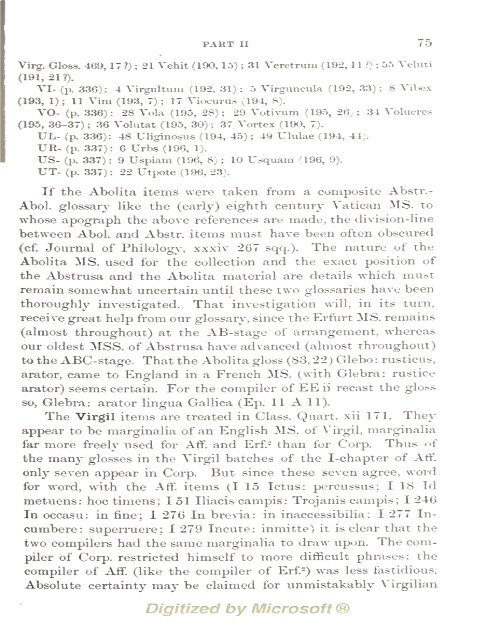the corpus, épinal, erfurt and leyden glossaries, viii - World eBook ...
the corpus, épinal, erfurt and leyden glossaries, viii - World eBook ...
the corpus, épinal, erfurt and leyden glossaries, viii - World eBook ...
Create successful ePaper yourself
Turn your PDF publications into a flip-book with our unique Google optimized e-Paper software.
PART II 75<br />
Virg. Gloss. 469, 17 ?) ; 21 Vehit (190, 15) ; 31 Veretrum (192, 11 ?) ; 55 Veluti<br />
(191,21?).<br />
VI- (p. 336): 4 Virgiiltiiin (192, 31) ; 5 Virguncuk (192, 33) ; 8 Vibex<br />
(193, 1); 11 Vim (193, 7) ; 17 Viocuius (194, 8).<br />
VO- (p. 336): 28 Vola (195, 28); 29 Voti\'um (195, 26); 34 Voluci-es<br />
(195, 36-37) ; 36 Volutat (195, 30) ; 37 Vortex (190, 7).<br />
UL- (p. 336): 48 Uliginosus (194, 45) ; 49 Ululae (194, 44).<br />
UR- (p. 337): 6 Urbs (196, 1).<br />
US- (p. 337) : 9 Uspiam (196, 8) ; 10 Usquam (196, 9).<br />
UT- (p. 337) : 22 Utpote (196, 23).<br />
If <strong>the</strong> Abolita items were taken from a composite Abstr.-<br />
Abol. glossary like <strong>the</strong> (early) eighth century Vatican MS. to<br />
whose apograph <strong>the</strong> above references are made, <strong>the</strong> division-line<br />
between Abol. <strong>and</strong> Abstr. items must have been often obscured<br />
(of. Journal of Philology, xxxiv 267 sqq.). The nature of <strong>the</strong><br />
Abolita MS. used for <strong>the</strong> collection <strong>and</strong> <strong>the</strong> exact position of<br />
<strong>the</strong> Abstrusa <strong>and</strong> <strong>the</strong> Abolita material are details which must<br />
remain somewhat uncertain until <strong>the</strong>se two <strong>glossaries</strong> have been<br />
thoroughly investigated. That investigation will, in its turn,<br />
receive great help from our glossary, since <strong>the</strong> Erfurt MS. remains<br />
(almost throughout) at <strong>the</strong> AB-stage of arrangement, whereas<br />
our oldest MSS. of Abstrusa have advanced (almost throughout)<br />
to <strong>the</strong> ABC-stage. That <strong>the</strong> Abolita gloss (83, 22) Glebo : rusticus,<br />
arator, came to Engl<strong>and</strong> in a French MS. (with<br />
Glebra: rustice<br />
arator) seems certain. For <strong>the</strong> compiler of EE ii recast <strong>the</strong> gloss<br />
so, Glebra: arator lingua Gallica (Ep. 11 A 11).<br />
The Virgil items are treated in Class. Quart, xii 171. They<br />
appear to be marginalia of an English MS. of Virgil, marginalia<br />
fer more freely used for AflF. <strong>and</strong> Erf.- than for Corp. Thus of<br />
<strong>the</strong> many glosses in <strong>the</strong> Virgil batches of <strong>the</strong> I-chapter of Aflf.<br />
only seven appear in Corp. But since <strong>the</strong>se seven agree, word<br />
for word, with <strong>the</strong> AfF. items (I 15 Ictus: percussus; I 18 Id<br />
metuens: hoc timens; 1 51 Iliacis campis: Trojanis campis; I 246<br />
In occasu: in fine; I 276 In bre\aa: in inaccessibilia ; I 277 In-<br />
cumbere: superruere; I 279 Incute: inmitte) it is clear that <strong>the</strong><br />
two compilers had <strong>the</strong> same marginalia to draw upon. The com-<br />
piler of Corp. restricted himself to more diflScult phrases: <strong>the</strong><br />
was less fastidious.<br />
compiler of Afi". (like <strong>the</strong> compiler of Erf-)<br />
Absolute certainty may be claimed for unmistakably Virgilian

















